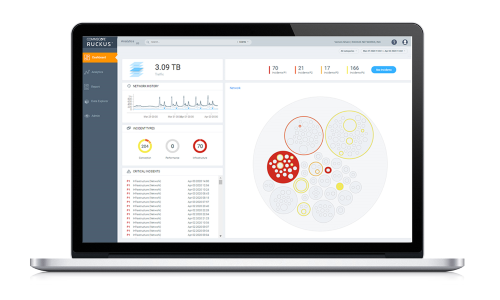Welcome to RUCKUS Networks, part of CommScope's world-leading portfolio of networking solutions. Learn more.
 More users, devices, device types and data traffic than ever before put increasing pressure on enterprise networks. As a result, modern network environments are also more complex than ever before. These parallel trends show no sign of letting up—to the extent that ordinary humans can’t keep up with routine service assurance tasks. Automation is the key to addressing this increased complexity, leveraging technologies like machine learning and artificial intelligence. (Learn more about that in a recent blog post called “Building autonomous networks with AI and ML.”)
More users, devices, device types and data traffic than ever before put increasing pressure on enterprise networks. As a result, modern network environments are also more complex than ever before. These parallel trends show no sign of letting up—to the extent that ordinary humans can’t keep up with routine service assurance tasks. Automation is the key to addressing this increased complexity, leveraging technologies like machine learning and artificial intelligence. (Learn more about that in a recent blog post called “Building autonomous networks with AI and ML.”)
The enterprise networking vendors are racing toward the self-healing network. CommScope made a major step toward that vision when it announced RUCKUS Analytics earlier this year. As you probably know, RUCKUS Analytics is a cloud service for network analytics and assurance. Powered by machine learning and artificial intelligence, it works with RUCKUS SmartZone and RUCKUS Cloud control and management architectures. The service helps you get the most out of your RUCKUS network. Now we have made additional strides toward the self-healing network that you will want to know about.
CLICK TO TWEET: CommScope’s Vernon Shure explains how RUCKUS Analytics is taking the next steps toward the vision of a self-healing network.
Automatic network service validation—without overlay sensors
IT pros know that helpdesk tickets are a very poor proxy for how well the network is functioning. That’s because users don’t initiate a ticket until they have already suffered a service disruption of some kind. And they fail to report many service issues entirely. The latest release of RUCKUS Analytics works with your RUCKUS network to allow the network to self-validate network service. The system does not require any overlay sensors to do this, as it uses a virtual client that resides on RUCKUS access points. Service validation identifies network problems early, enabling IT teams to proactively address more issues before they affect users.
AI-enabled virtual network assistant—just ask Melissa
You’ve probably interacted with virtual assistants in a variety of contexts as a consumer, such as shopping or getting customer service online. Now RUCKUS Analytics has Melissa, a new AI-enabled virtual network assistant that answers your questions about network operations. Melissa uses natural language processing to discern the nature of your inquiry and offer up an insightful response. The new virtual network assistant makes it even easier and faster to get at the information you need to effectively manage network operations for your organization.
IT service management (ITSM) integration
What if users didn’t have to initiate a service ticket for the ticket to be created? That would address the non-reporting of service incidents referenced above. This is another area where RUCKUS Analytics automates routine tasks. It now integrates with popular IT service management (helpdesk ticketing) platforms using webhooks to automatically file helpdesk tickets when the system identifies a service issue that needs to be addressed. This works with popular platforms like ServiceNow, Salesforce and any ITSM platform that can accept webhooks. It’s a powerful new capability because it enables proactive IT, as teams get a head start on resolving the issue. When IT sees the ticket, RUCKUS Analytics has already traced the root causes of the incident and specified steps for remediation. These are available in the incident analytics module within RUCKUS Analytics.
Two-tiered management structure—service providers log in only once
Another exciting new capability will be of special interest to RUCKUS networking solution providers, including managed service providers (MSPs). Customers can now designate a third party, such as a RUCKUS networking solution provider, to manage their RUCKUS Analytics account. The solution provider can view the various accounts under management from a single login, and effortlessly move from one to another without having to log out and log in again. This same capability will come in especially handy for MSPs who manage multiple end-customer accounts. We’ve seen great uptake with MSPs right out of the gate with this product, and this makes the value proposition for them even stronger.
Taking the next steps toward a self-healing network
As a cloud service, RUCKUS Analytics has a constantly-evolving set of capabilities. We wanted to specifically call out these important enhancements in product functionality as among the highest-impact new features. These are important next steps toward the vision of a self-healing network. There are other incremental improvements in the latest release that are not discussed in this blog. To learn more, a great place to start is our RUCKUS Analytics YouTube playlist for the product. Current SmartZone customers (5.1.2 and above) can also request a free trial (eligibility policies apply). Non-customers can request a demo. Stay tuned to learn about other new capabilities of RUCKUS Analytics in the near future.












